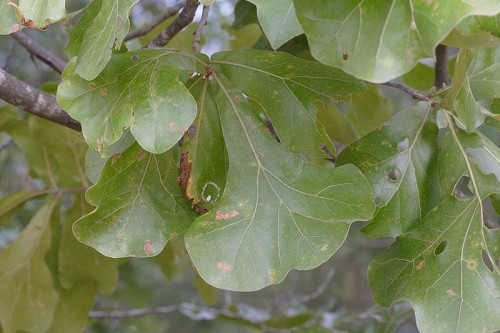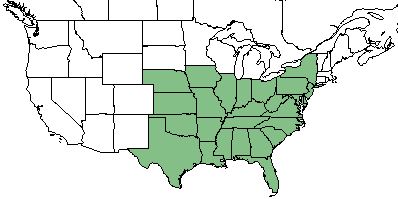Difference between revisions of "Quercus marilandica"
(→Ecology) |
(→Ecology) |
||
| Line 40: | Line 40: | ||
<!--===Seed dispersal===--> | <!--===Seed dispersal===--> | ||
<!--===Seed bank and germination===--> | <!--===Seed bank and germination===--> | ||
| − | + | ===Fire ecology=== | |
| + | ''Q. marilandica'' has a low tolerance for fire. <ref name= "USDA"> [https://plants.usda.gov/core/profile?symbol=CEAM USDA Plant Database]</ref> | ||
| + | <!--Fire tolerance, fire dependence, adaptive fire responses--> | ||
<!--===Pollination===--> | <!--===Pollination===--> | ||
<!--===Use by animals===--> <!--Herbivory, granivory, insect hosting, etc.--> | <!--===Use by animals===--> <!--Herbivory, granivory, insect hosting, etc.--> | ||
Revision as of 08:16, 29 May 2018
| Quercus marilandica | |
|---|---|

| |
| Photo by John Gwaltney hosted at Southeastern Flora.com | |
| Scientific classification | |
| Kingdom: | Plantae |
| Division: | Magnoliophyta - Flowering plants |
| Class: | Magnoliopsida - Dicots |
| Order: | Fagales |
| Family: | Fagaceae |
| Genus: | Quercus |
| Species: | Q. marilandica |
| Binomial name | |
| Quercus marilandica Munchh | |

| |
| Natural range of Quercus marilandica from USDA NRCS Plants Database. | |
Contents
Taxonomic Notes
Synonym: Q. neoshei (Bush)
Variety: none
Description
Q. marilandica is a perennial shrub/tree of the Fagaceae family that is native to North America. [1]
Distribution
Q. marilandica is found throughout the eastern United States; as far north as New York and as far west as Texas. [1]
Ecology
Habitat
Common habitats include upland forests and woodlands. It prefers droughty soils of clay, deep sands, or sandstones. [2]
Q. marilandica has been known to have a high tolerance to drought but it is not tolerant of shade. [1]
Phenology
Blooms typically occur during the mid spring and seeding in the fall. [1]
Fire ecology
Q. marilandica has a low tolerance for fire. [1]